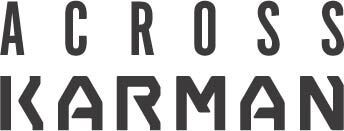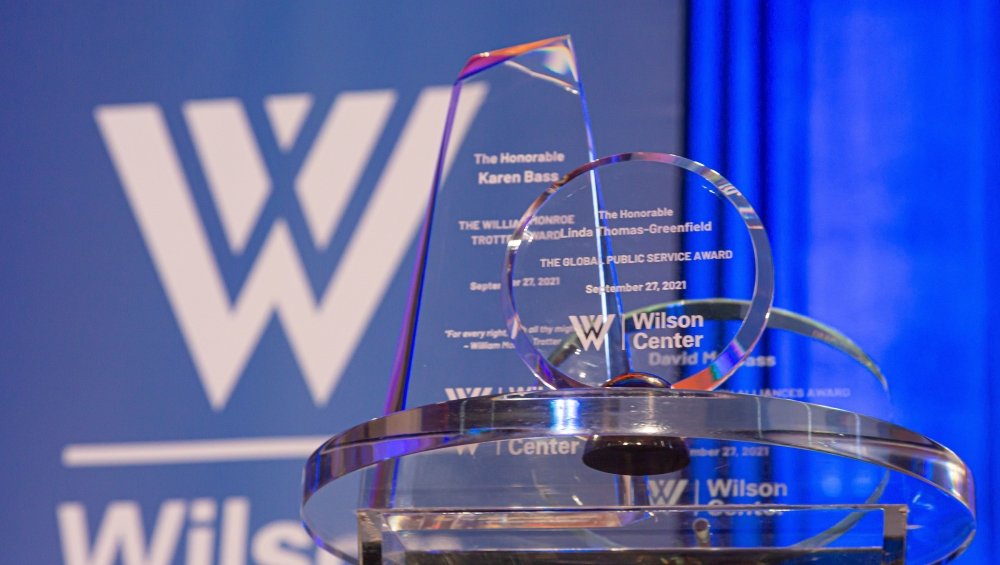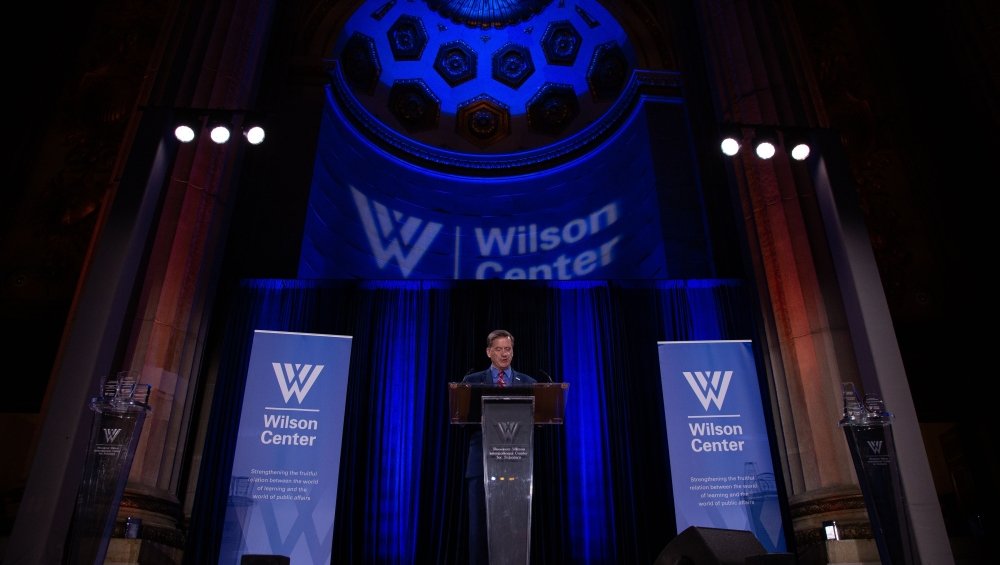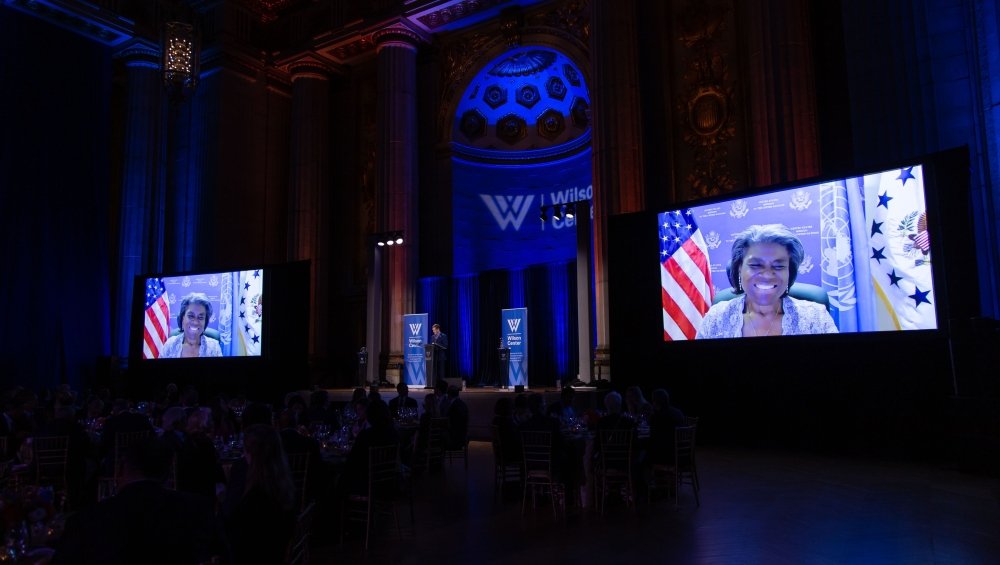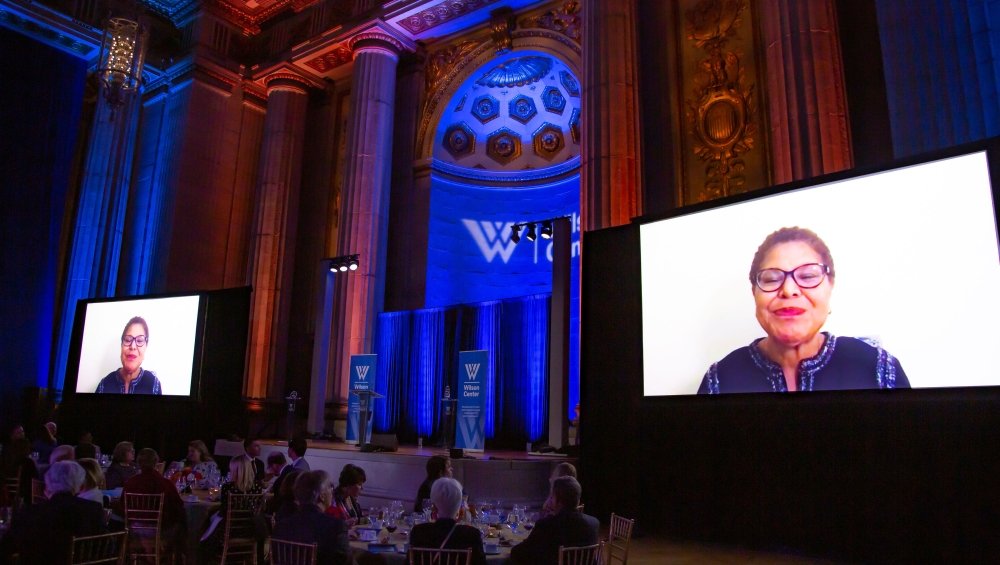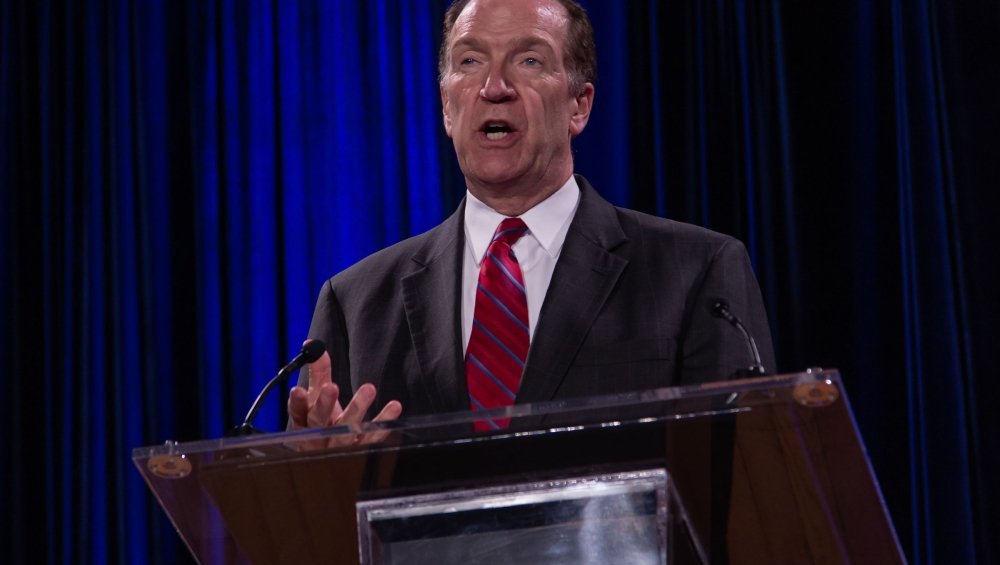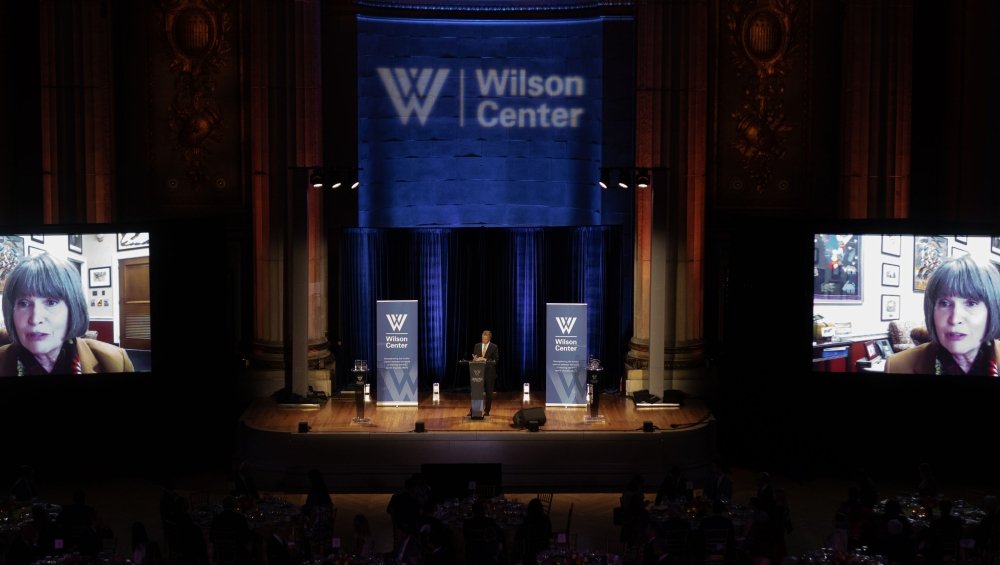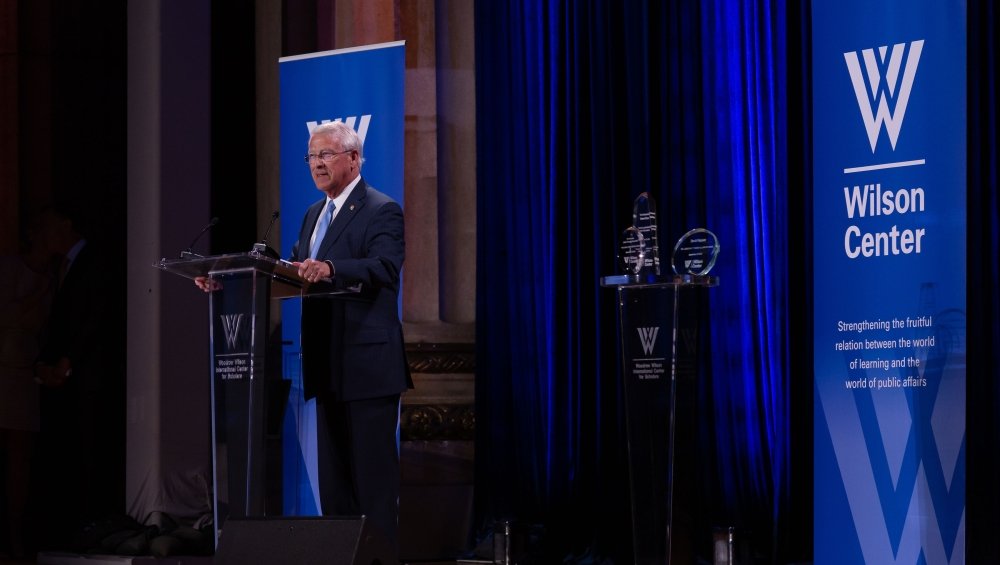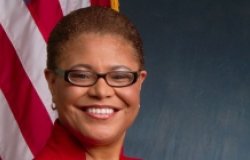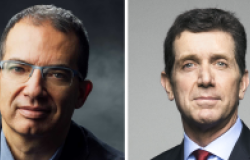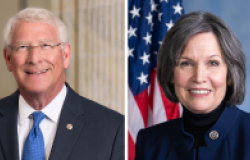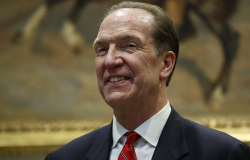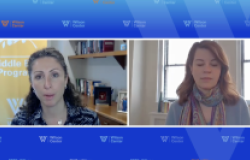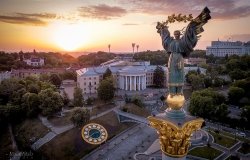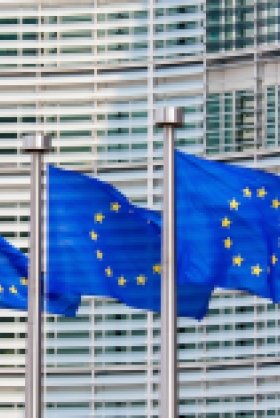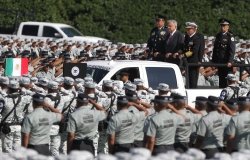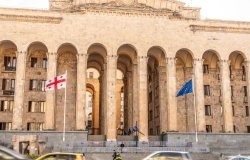Wilson Center
2021 Wilson Awards
At an Awards gala in Washington, DC, the Wilson Center honored Amb. Linda Thomas-Greenfield, David Malpass, Senator Roger Wicker (R-MS), Representative Betty McCollum (DFL-MN), Rep. Karen Bass, Stéphane Bancel, and Alex Gorsky on September 27, 2021.
Overview
At an Awards gala in Washington, DC, the Wilson Center honored Amb. Linda Thomas-Greenfield, David Malpass, Senator Roger Wicker (R-MS), Representative Betty McCollum (DFL-MN), Rep. Karen Bass, Stéphane Bancel, and Alex Gorsky on September 27, 2021.
Selected Photos
Selected Quotes
Bill Haslam
My view of the Wilson Center is, now more than ever, in a world that has become increasingly polarized, and partisan, to have someone who is trying to take a non-partisan point of view, is working out problems around the world, is needed now more than ever. And in a world that has become post-factual, if you will, it is wonderful to have someone driving towards facts and truth like the Wilson Center is.
Mark Green
You’re joining us this evening because whatever your politics or persuasion, you believe in engaged, informed American leadership. You know that whatever challenges the world confronts, or in some cases causes, none of them gets better if America steps back or steps aside. You believe in the power of knowledge and the energy of ideas. We all agree that information matters and that metrics are crucial, but you’re also looking for clear-eyes analysis and judgment as well. That’s why the Wilson Center exists. For the purpose of, as Congress put it some years ago, strengthening the fruitful relationship between the world of learning and the world of public affairs. And that’s what we aim for each and every day, with bi-partisan support from the Hill and the kind support of all of you. We’re a place where independent thinking and honest debate still thrive. Many institutions claim independence but it’s in our DNA. It’s why our scholars and fellows join in our work and its why leadership from around the world turn to us time and again.
Roger Wicker
During the Cold War, we avoided nuclear confrontation with the Soviet Union but made it clear to people of courage that we were on their side and doing every practical thing we could to make their dreams of freedom a reality. We made that promise to people like Vaclav Havel in Czechoslovakia and Lech Walesa in the shipyards of Gdansk and Aleksandr Solzhenitsyn who wrote about the gulags in Soviet Russia. They were the patriots on whose shoulders modern-day heroes have stood, like Sergei Magnitsky and Boris Nemtsov, both of whom confronted current Russian dictatorships, kleptocracy, repression, and then paid for it with their lives.
And so I accept this award tonight in memory of these and other martyrs, and freedom fighters, in honor of leaders like Alexei Navalny, who have taken up their cause. Sergei Magnitsky’s name has now become a rallying cry for those of us to hold human rights abusers to account.
Betty McCollum
I'm going to read a quote. We did a little research on Woodrow Wilson's philosophy and I liked this one, and I quote: “You are here in order to enable the world to live more amply, with greater vision, with a finer spirit of hope and achievement. You are here to enrich the world.” And that's what the Wilson Center helps many of us in Congress do through their research, and through all their work, and their sharing of work, bringing people together to have great conversations. As was pointed out, I'm here at home in my office, because we do have great challenges right here in the United States, but I believe that we can work together to find a finer spirit, to create opportunities for hope and achievement, and yes, to take action to move America forward.
Stéphane Bancel
It took a village, a very big team, to get Moderna’s COVID-19 vaccine to the American people in less than a year from the start of the pandemic, and then to the world. I would like to thank our employees and their families. Their sacrifice and their commitment fighting this virus was humbling. They worked literally day and night, pulling all-nighters, working every Saturday and Sunday because they knew every hour mattered to help save people to get us back to normal life.
I want to thank our suppliers who took incredible business risks so that we could save additional hours, additional days. It has been an incredible partnership between industry and the government. I would like to thank Dr. Faucci’s team for their help. I want to thank the CDC and the FDA. I’ve been in this industry for 25 years. If you had told me over the last 25 years that we could go so fast, I would not have believed it. And last but not least, is, only in America. Moderna is an incredible American innovation story. Many people think this was an overnight story, but this was ten years of hard work, millions of dollars of investment, and people committed to find a way for innovation to change the world.
Alex Gorsky
As we come together in year two now of this precedented global pandemic, that few of us could ever have imagined 20/30 years ago, that we would be in this kind of position, I think everyone gathered here tonight would agree with the Wilson Center's mission. It's more relevant and urgent now than ever. From the very earliest days of COVID-19, when there was so much uncertainty, so much concern, when leaders everywhere were grappling with disruption and uncertainty, one thing became eminently clear, and that was, the best way to confront a health challenge of this magnitude would be through shared action and global cooperation at every level. And I could not be more proud of our industry and the way that we worked with so many different stakeholders, collaborating, and that kind of partnership, well, it's been so instrumental, both in developing multiple vaccines for COVID-19. But very importantly, and actually getting those shots in the arms of as many people as possible around the world.
Linda Thomas-Greenfield
The President announced last week that we will be donating 500 million vaccine doses for a total of 1.1 billion doses—more than any other county’s donations combined. We're doing this because nobody is safe until everyone is safe. And because there is a real person that benefits from every single one of those doses. The President referred to it as a dose of hope. Similarly, last week, we advanced figures tackling climate change. The President announced he would work with Congress to quadruple climate aid to foreign countries more vulnerable to the climate crisis. Special envoy Kerry crisscrossed New York, just as he had been crisscrossing the world to raise climate ambitions of nations. And Secretary Blinken called on the Security Council to stop debating whether the climate crisis belongs on the agenda and instead ask how the Council can leverage its unique powers to address it.
These actions aren’t abstract, but ultimately, they are about stopping the devastating hurricanes, the floods, such as what we experienced here in New York a few weeks ago, wildfires that destroyed the homes and lives of so many of our friends and neighbors. And the same is true for work defending democracy, human rights, and the international rules-based order. It’s why President Biden is leading a summit on democracy this December, bringing together a diverse set of democracies to demonstrate that a government by and for the people is still the best way to deliver for all of our people. We're running to be on the Human Rights Council based on a similar principal—that by having a seat at the table, we can push back against those who seek to corrupt the body, and help build a united front of allies and partners to hold human rights abusers accountable. Defending democracy, promoting human rights, holding human rights abusers accountable—these aren't just nice ideas. The journalist who gets locked up for doing their job deserves their freedom. The protesters who face violence for demanding democracy deserve our protection. And when a humanitarian aid work is killed for trying to save the lives of innocent citizens, that demands accountability. And so, in everything we do, I try to remember who we are serving.
Karen Bass
I’ve worked on Congress on Africa for eleven years and I believe that with the current administration, and the leadership we have in place, we can begin to shift the narrative by decreasing the focus on aid and development, and increasing the focus on trade. I know that when Ambassador Green was the administrator for USAID, we talked about this many times. We talked about shifting the paradigm for how we do foreign aid into more capacity building and partnership with African countries, rather than a charity model. So I believe the time is now for us to do just that. I recently met with the Presidents of Angola, Zambia, and Namibia, and while each country’s situation is different, they all reiterated the need for the United States to use its soft power and engage more in business and culture. I also believe that we can move U.S. foreign policy forward in a more lasting way, if we can bring the continent’s vast, diverse culture to the world, by highlighting their music, movies, and helping export their food within the continent and internationally, instead of promoting aid without a real economic alternative.
David Malpass
We're in, and we should recognize that, a time of immense upheaval. I was writing down some of the ways that we're in upheaval: Economics is in upheaval, trying to understand how 0% interest rates can be consistent with a growth rate that's continuing in the world and with the rising inflation rate, these are big challenges. Science is in a huge upheaval, trying to figure out how to push forward vaccines very rapidly in terms of the production schedule, how to deal with climate change, how to keep going with the innovation that's occurring in the digital world.
All of these are very valuable to developing countries, and the benefits need to spread. We also have data itself, so at the World Bank, we are innovating, in terms of, how do we have data that's relevant for the problems that people are facing now, including the climate challenge. How are we measuring the greenhouse gas emissions reduction?
One of the things that we've done on vaccines that's relevant, from a data standpoint, is the task force that I chair and co-chair with Tedros of the WHO, and joined by Ngozi, of the WTO, and Kristalina, my friend at the IMF, and we're working to supply data on vaccines that will allow and facilitate the delivery of vaccines to people in the developing world. It's a huge challenge because there's such a big gap and our task force identifies the gap and reports data on it, which is important—a gap between the donations and the actual delivery of doses and the vaccination of people around the world. There's also an upheaval in finance, so we're looking for new ideas every day for ways to finance climate change, for ways to build more resources for the developing countries.
Thank you for your interest in this event. Please send any feedback or questions to our Events staff.
